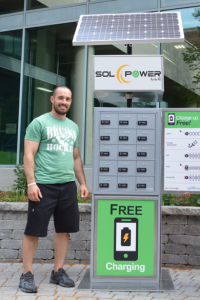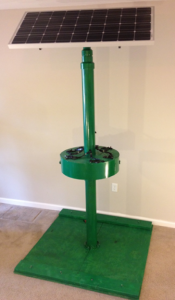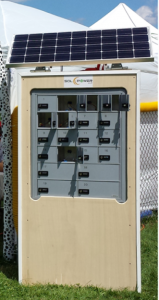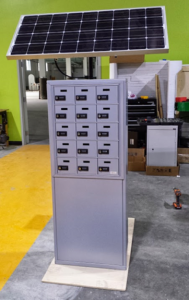Ryan Wright – CEO, Sol Power LLC
 Sol Power* provides solar powered, modular, secure cell phone charging stations for organizations and events. The charging stations are free to the end user and are supported by advertising fees. Sol Power has been extremely well received at music festivals, outdoor venues, and other events and locations in the past year.
Sol Power* provides solar powered, modular, secure cell phone charging stations for organizations and events. The charging stations are free to the end user and are supported by advertising fees. Sol Power has been extremely well received at music festivals, outdoor venues, and other events and locations in the past year.
When a Sol Power charging station mysteriously showed up in the Greentown Labs courtyard last week, we decided we needed to learn more about the company from CEO Ryan Wright. Prior to Sol Power, Ryan worked in multiple operations leadership roles at Skyworks Solutions and BAE Systems. He has a B.Sc. in Industrial Engineering from Northeastern University, and an MBA from Babson College.
Rapid Fire
| What do you want as a super power? | Favorite book | Greentown tech you wish you’d invented: |
| To be Wolverine | Water for Elephants | Promethean Milk Chiller |
|
Favorite thought leader? |
What’s your typical Friday night? | One thing you couldn’t survive without? |
| Yogi Berra | At Greentown Labs |
Sunshine |
*Update, June 28, 2018: Sol Power is now WrightGrid
My Company
How did your company start?
 I like technology, so I knew I wanted to start a clean tech business, but I didn’t know what it was going to be or look like. Over time in my MBA program, I tried to take part in any program or classes that had a sustainability component. In one, we had the option to either evaluate an existing business’s sustainability score or come up with an idea for our own sustainable/green business. My team was brainstorming and found an area of common ground: our phones are always dying and need to be charged at very inconvenient times. So we thought, how can we address that need, but do it in a more sustainable way?
I like technology, so I knew I wanted to start a clean tech business, but I didn’t know what it was going to be or look like. Over time in my MBA program, I tried to take part in any program or classes that had a sustainability component. In one, we had the option to either evaluate an existing business’s sustainability score or come up with an idea for our own sustainable/green business. My team was brainstorming and found an area of common ground: our phones are always dying and need to be charged at very inconvenient times. So we thought, how can we address that need, but do it in a more sustainable way?
I started by building a functional prototype to prove to myself the idea wasn’t crazy. The first station was made from Radioshack parts and home depot materials, and assembled in my parents garage. I built it from PVC pipe and wood, and took it in front of investors at Babson. They tore it apart – told me it didn’t have the right look and that the end user would never pay for it.
As a next step I realized I needed to bring an electrical engineer on board. With his help, we designed the next station with a more well developed electrical system and a very basic wood shell. It looked pretty rough, but we deployed it anyways at a music festival last fall to get user feedback. To our surprise, users loved it. We, on the other hand, discovered the pains of moving a solid 500lb design, not to mention the fixed solar panel which required us to move the station every hour or so to track the sun. It was a lower back injury waiting to happen.
next station with a more well developed electrical system and a very basic wood shell. It looked pretty rough, but we deployed it anyways at a music festival last fall to get user feedback. To our surprise, users loved it. We, on the other hand, discovered the pains of moving a solid 500lb design, not to mention the fixed solar panel which required us to move the station every hour or so to track the sun. It was a lower back injury waiting to happen.
Finally we hired a mechanical engineer to design the outside frame—a fully metal station, fabricated in a metal shop.

What is top of mind right now in your company development?
We’re a bootstrapped startup, that’s how we keep going. Short term rentals in New England is really where we’re getting the early traction, because it is a much quicker sales cycle. At the same time, we are pursuing sales options outside of New England, such as college & universities, high schools, sports and music venues and ski resorts.
Huge success at #sweetlife2014 charging over 500 phones!!! Big thanks to our ad sponsor #alexandani pic.twitter.com/1n9DQ4jcRP
— Sol Power (@Sol_Power_LLC) May 14, 2014
There has also been interest from developing markets, especially where there is heavy cell phone usage, but limited grid access for charging, in parts of South America, Africa and India. In those markets there’s the potential to lease to local entrepreneurs, incorporating microfinancing. It’s a much different business model and we don’t fully understand those markets just yet, so we’re trying to prove the current business model here in the US first.
What are your aspirations for the company?
Our bread and butter is point of use power generation. We’re not doing big solar farms, we’re doing microsystems that can power individual pieces of equipment or many small devices. In the future, everything is going to need to be connected. So we’re taking what’s traditionally just grid powered and moving it to the point where it’s untethered. If the company grows the way we hope it will, we will continue exploring that idea.
My Work
What motivates you?
It’s the possibility that any day could be that day that you make that incredible connection to a partner, sponsor, or customer that could make a huge difference in your trajectory. Right now we’re selling stations largely one at a time, but that could all change very quickly if we make the right connection.
The people that I meet on a day-to-day basis are incredible. Just the other day there was a tour going through the Greentown Labs prototyping space and a development person from Africa stopped to chat with our team. She said our stations are perfect for the area where she’s doing development work, and just like that we made a meaningful connection. And being a part of Cleantech Open, the mentors are connecting us to phenomenal resources, on a daily basis, that we wouldn’t ever have had access to.
My Greentown Labs
What brought you to Greentown Labs?
While I was at Babson, I was in the Entrepreneurship Intensity Track, which was essentially a class that gave me credit for work on my startup idea. One of the things I was required to do was attend networking events, so I started hanging out at the old Greentown location and got to know Emily. She said, “You’re here all the time, would you be interested in renting some space?”
What’s something that has surprised you about Greentown Labs?
The openness of folks to help. Everyone here is at different stages of developing their business. There are some that have customers and are generating a profit, while others are still in that discovery mode where revenue is still quite a ways off. But it helps to have all these people around you who have done what you are trying to do, and they’ve done it all very recently.
What Greentown Labs resources do you currently use?
We’re currently using SolidWorks and Altium (we were pestering Greentown for it, and are really glad they were able to help!). We’ve also used the HB Agency office hours and participated in several of the after hours events.
My Advice
What advice would you give to a hardware entrepreneur?
The first piece of advice is around how you finance your business. A lot of people think you need to go out and get a whole lot of institutional funding. It’s certainly one way to fund a business. We’ve been a little creative in our financing to get to where we are today. So before you go running to pitch to angel and VC’s for money, think about what you want to achieve and how fast you want to achieve it. You’ll be surprised how often there are other ways to achieve your milestones.
A great resource for us has been MassCEC, who helped us hire and pay for interns, as well as providing grant money. Looking for grants and finding ways to leverage the communities you’re involved with really go a long way.A lot of schools have great programs, but don’t necessarily advertise them as well as they could. Then network like crazy, get to know people in a number of networks. They may be able to make an introduction, which leads to a team member, service provider, maybe even your first customer.
The second piece of advice is based around development strategy. With a start-up, it’s all about getting something out there. It doesn’t have to be perfect or the best thing since sliced bread, Let’s just get something out there in our customer’s or end user’s hands and we’ll learn from them, rather than be stuck in analysis paralysis. At the end of the day, until you have something in your customers and users hands, the learning curve isn’t going to be the same. In some cases it’s a little more expensive short term, but long term it can really save you lots of time and money. You’re constantly iterating, and improving. Our product is by no means perfect right now, but each time it gets a little better based on the feedback we’ve received from our users and customers.

